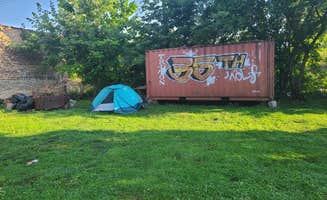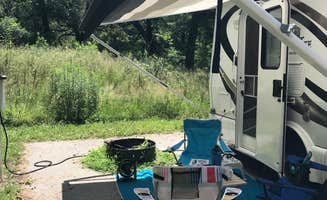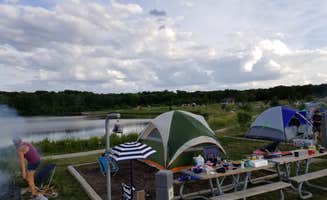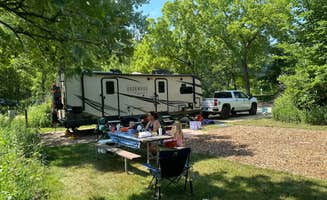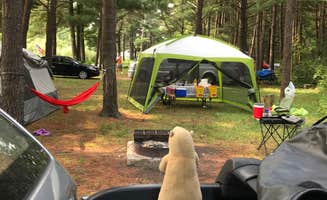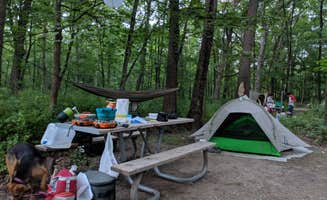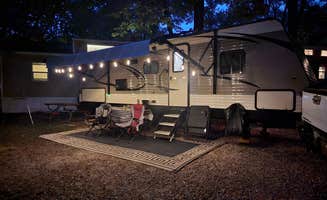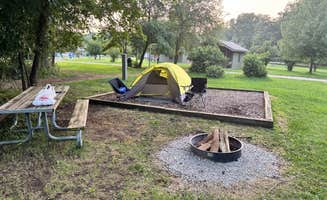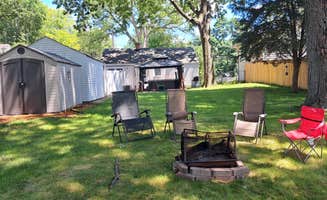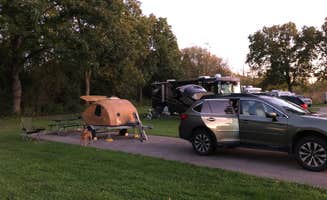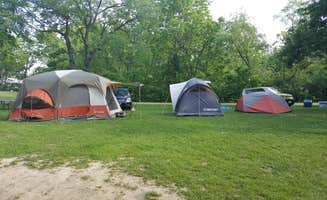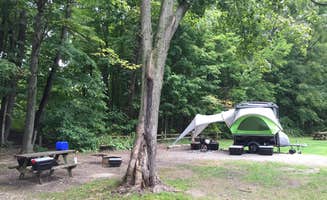Camping opportunities near Skokie, Illinois exist primarily within county forest preserve systems rather than traditional state or national parks. The Chicago area's terrain consists of flat to gently rolling prairies interspersed with small lakes and ponds, with elevations ranging from 580 to 730 feet above sea level. Most campgrounds operate seasonally from May through October, though a few offer limited winter availability.
What to do
Mountain biking and trail access: Camp Bullfrog Lake offers extensive mountain biking trails directly accessible from campsites. "The mountain bike trails were awesome. If you're a trail rider, you must stay here. There are miles and miles of trails. We saw several vehicles carrying top of the line bikes in and out all day," notes one visitor to Camp Bullfrog Lake.
Water activities and fishing: Multiple lakes provide recreational opportunities across Chicago-area campgrounds. "The kayaks are $15 an hour and include life vests. The lake is pretty small but it was fun to putter around," shared a camper at Camp Bullfrog Lake. Blackwell Forest Preserve features fishing options across multiple bodies of water, with one visitor noting, "The fishing is outstanding. There are lots of places along the lake and ponds to get an easy catch and release."
Hiking options: Blackwell Family Campground maintains several hiking trails suitable for beginners and families. "Sites 21 & 22 may not be able to see traffic on the busy Winfield Rd in the summer, but you will still hear it at those sites," advises one visitor about site selection to minimize road noise during hikes.
What campers like
Clean, well-maintained facilities: Campgrounds in the region receive high marks for cleanliness. At Camp Reinberg, visitors praise "shower building, restrooms (seriously the cleanest I've ever seen, even the ceilings were cleaned!) and cabins, along with tent sites and 5 RV sites, 2 of which are paved."
Urban accessibility: Many campers value proximity to Chicago while still accessing nature. "Located in the Norwest suburb of Palatine, this campground is super accessible from Chicago and a fun getaway for suburban camping. Grocery stores and modern conveniences are minutes away," writes a visitor about Camp Reinberg.
Trail connections: Paul Wolff Campground offers interconnected trail systems. "There are a few trails and I've seen lots of butterflies, gold finches, hawks, deer, flocks of giant sandhill cranes, rabbits, ground squirrels, and of course actual squirrels," reports one camper.
What you should know
Reservation requirements: Most campgrounds require advance booking, particularly during peak season. "We decided to spend the weekend here because I had a client meeting at sunrise the first morning of our stay in downtown Chicago. It saved me making a 3 hour drive the morning of," notes one visitor explaining why they chose Camp Sullivan.
Limited utilities: Water access varies significantly between campgrounds. "The staff has to hook up a very very long hose and will bring it to your site. You can get water, it's just an inconvenience for you and them," explains a camper at Camp Reinberg regarding water hookups for RVs.
Noise levels: Urban proximity means varying noise levels from roads, trains, or neighboring campers. "Sites are pretty close to each other, but neighbors were quiet," observes one Camp Bullfrog Lake visitor, while another notes, "It's just outside of Chicago and it feels like it. It's like camping in a city park."
Tips for camping with families
Playground access: Several campgrounds offer recreation areas specifically for children. At Indiana Dunes State Park, "Our site was right between the playground and beach trailhead, but still private," making it convenient for families with children.
Easy hiking options: Look for campgrounds with gentle trails suitable for children. "There are miles of trails. On one hike we were on paved, sifted gravel, grass and single trek trails. There are a lot of loops giving you options," notes a visitor to Paul Wolff Campground.
Site privacy considerations: For families seeking more seclusion, specific sites offer better privacy. "We were in spot 2 which had more privacy but felt more cramped. This time I was in spot 18 which felt like it had more space but had almost no shade," shares one visitor comparing sites at Camp Bullfrog Lake.
Tips from RVers
Pad types and leveling: RV sites vary in surface material across campgrounds. At Dunewood Campground, "The campsites are large and beautiful," though pad composition varies from campground to campground, with some featuring gravel, concrete, or asphalt pads.
Hookup limitations: Most campgrounds offer electric hookups but limited water or sewer connections. "It is electric only but that didn't really bother us—we just showed up with the water tank full and other tanks empty and enjoyed ourselves," explains an Indiana Dunes State Park visitor.
Dump station availability: Plan for waste management needs. "Two dump stations made wait minimal," notes a camper at Indiana Dunes State Park, while others recommend checking availability ahead of time since not all campgrounds provide this service.


